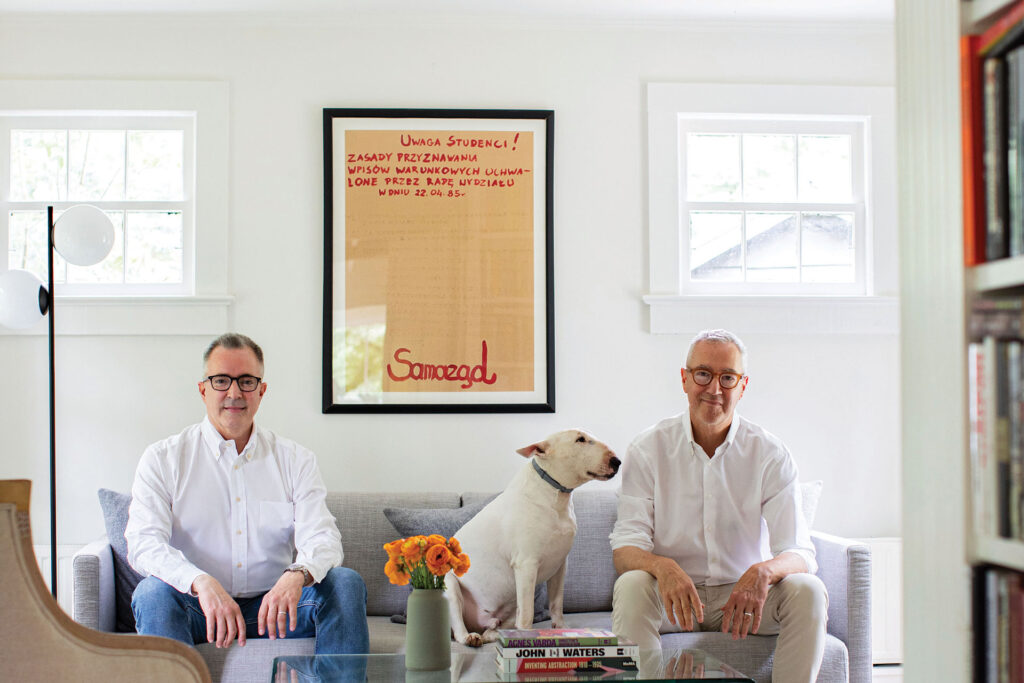And The Oscar Goes To… The CEO of the Academy of Motion Picture Arts & Sciences, on meeting the love of his life and falling for his husband’s hometown of Hillsdale, NY.
By Kevin Sessums
Photography by Quentin Bacon
When lilacs last in the dooryard bloom’d,
And the great star early droop’d in the western sky in the night,
I mourn’d, and yet shall mourn with ever-returning spring.
Ever-returning spring, trinity sure to me you bring,
Lilac blooming perennial and drooping star in the west,
And thought of him I love.
—Walt Whitman, “When Lilacs Last In The Dooryard Bloom’d”
I find myself sometimes thinking of Walt Whitman when I’m scrolling around on Tinder before slowing to a halt yet again from the ennui that settles in as the replacement for longing. What would Whitman think of this construct on such an apparatus for a certain sort of societal discourse between gentlemen of a certain sort which can lead to sexual congress or maybe even matrimony? Would he long instead for his simpler times when all you needed was your ability to brave the weather alone as you tried to find a way home? He met one of the loves of his life at first sight while doing just that. “How different Walt was then in Washington from the Walt you knew in later years,” Peter Doyle told Dr. R. M. Bucke, one of Whitman’s early champions, who edited and published Whitman and Doyle’s letters in 1897 as Calamus: A Series Of Letters Written During The Years 1868-1880 by Walt Whitman To A Young Friend (Peter Doyle). “You would not believe it. He was an athlete—great, great. I knew him to do wonderful lifting, running, walking,” Doyle continued. “You ask where I first met him? It is a curious story. We felt to each other at once. I was a conductor. The night was very stormy—he had been over to see his friend John Burroughs before he came down to take the car—the storm was awful. Walt had his blanket—it was thrown round his shoulders—he seemed like an old sea-captain. He was the only passenger. It was a lonely night, so I thought I would go in and talk with him. Something in me made me do it and something in him drew me that way. He used to say there was something in me had the same effect on him. Anyway, I went into the car. We were familiar at once—I put my hand on his knee—we understood. He did not get out at the end of the trip—in fact went all the way back with me. I think the year of this was 1866. From that time on we were the biggest sort of friends.”
Bill Kramer and Peter Cipkowski, who have a home in Hillsdale, NY, which is known as “Dooryard,” met on Tinder when they each were in Providence, RI on business trips and from that time on have been the biggest sort of friends. They “felt to each other at once.” So much so, they were married in 2019 and spend most of each year now in Los Angeles where Kramer is the CEO of the Academy of Motion Picture Arts and Sciences (the Oscars), and Cipkowski, an educational technology consultant, lectures at UCLA. But they spend holidays and many weeks each summer at “Dooryard” in Hillsdale since Upstate New York has always been Cipkowski’s home. He even served as a town supervisor there for many years after having grown up above the bar in his family’s Taconic Wayside Inn in Copake Falls. Is that where they spent their honeymoon? “We didn’t have time for a formal honeymoon,” Kramer tells me as he and Cipkowski sit side by side in their kitchen in Hillsdale looking like the hosts of a morning talk show I’d tune in for if I had a television. “Because right after the wedding I accepted the job that brought us back to LA to be the director and president of the Academy Museum. So we almost immediately moved to Los Angeles, which became our honeymoon.”
“We did, however, go to the Chatham Bars Inn on the Cape for a long Labor Day weekend about a month after the wedding and we were able to honor it that way,” says Cipkowski, who resigned his job as the town supervisor in Hillsdale to live life more fully in Los Angeles with his husband.
“Since living in Los Angeles became part of Peter’s love for you, Bill, is part of your love for him your love for Hillsdale?” I ask.
“Absolutely,” Kramer says without hesitation. “I’ll never forget our first Tinder date in Providence. I was working on a project for RISD [Rhode Island School Of Design] and Peter was teaching a class at Brown [University]. We didn’t think we were going to have time to meet since he was going back to New York, so we grabbed a lunch. In my prior life I had looked at houses up in Columbia County because I had lived in New York, and I was always attracted to this area. When he told me he was a supervisor in Hillsdale with a beautiful home in Hillsdale, I immediately fell in love.”
Kramer laughs. Cipkowski smiles rather wanly, but with warmth.
“I’m teasing,” Kramer says. “But I do absolutely love it up here. So this has always felt like home.”
“It did feel sort of instant,” says Cipkowski when I asked if it was love at first sight. “We were both ready for something serious and we’re both kind of serious guys. We had both clearly been around the block. We ended up spending the next weekend together here in Hillsdale. Bill came up.”
“It was love at first sight for me,” says Kramer. “Our second date was that weekend here in Hillsdale and the town became a core part of the fabric of our relationship. I not only fell in love with Peter but the house and his friends and family.”
People, for good and bad, are always complaining about Upstate towns not being what they once were because of the influx of monied outsiders. Cipkowski has had the vantage point of experiencing such change by being a local Upstate kid and then a town supervisor and now mostly a weekend and holiday inhabitant himself in the kind of well-appointed home that awaits. “When I was 17, I got the hell out of here and never thought I’d come back,” he says. “In the early 1990s, I was able to buy this house from the gentleman for whom I used to mow the lawn. I couldn’t really afford it, but we made it happen. It was a weekend place then because I was living and working in New York City. But you’re right. Back then Hudson was boarded-up—extremely boarded-up—but through the ’90s the spotlight sort of turned on a bit. Some amazing designers and antique dealers were doing some great work there. Same thing in Hillsdale. It was very much a rural town like other rural towns in America that had no longer found a way to function. As a supervisor, I was able to see the change and help direct some of the positive change. Hudson and towns like Hillsdale are at a crossroads. We’re lucky because we’re between Hudson and Great Barrington, which was also boarded up when I was a kid.”
It’s been The Great Unboarding. Kramer, for his part, got his master’s degree in urban planning and public policy. “On that first date of ours in Providence, Peter, who was then still the town supervisor, was talking about a master plan for Hillsdale that he commissioned from an agency called Project for Public Spaces which I knew about from my urban planning days.”
“As one talks about on a first date,” I offer.
“Oh, it was hot,” says Cipkowski whose wan warmth settles into a wryness which has awaited its arrival as if it were a weekend home itself, comfortable and comforting, manicured but not too mannered.
“I just loved that Peter is a great intellect and so curious about people and places and the evolution of places,” says Kramer whose varied career through lots of big arts organizations and nonprofits has also been enhanced by those same personal attributes, a career which has now culminated in his being the CEO of the Academy of Motion Picture Arts and Sciences which includes not only the Oscar ceremony each year but also the Academy Museum and its many other programs and branches. Both men have big, rich lives, as do many people who weekend Upstate. Is Hillsdale a respite from those lives, or the rescue they seek from them? Is living Upstate a kind of urban planning of the more personal sort? The Great Unboarding has, in its way, given way to The Great Unburdening. “Respite is a great word,” says Kramer. “We recharge here. But we’re also very social here. I find that in addition to being a great place of beauty and relaxation, there’s a real community that we connect with as well as cultural institutions.
So we feed ourselves creatively while we’re here which is also a way of recharging. I can work from anywhere.”
But because of the nature of Kramer’s job does he ever quit working even when in nature?
“Never,” says Cipkowski. “Never.”
“I’m always working, and I love it,” Kramer insists. “It’s a great privilege. When I’m here and I’m working, I think creatively in a way sometimes I don’t when I’m in Hollywood. I’m slightly removed. I can strategize and think about thebig picture that helps me vision out the future in a different way. It actually feeds into my work in a very healthy way.”
Diplomacy has been a part of each man’s professional life. Kramer has to navigate Hollywood and the movie industry with its many egos demanding agency from his perch of institutional power. Cipkowski when he was a supervisor had to navigate politically a region that can be culturally polarized. “Bill’s experiences as the CEO of the Academy are on a larger scale but they do feel at times what my experience was like as a supervisor participating in this town that, like a lot of towns in the region, are polarized to some degree. I had to work very hard to bridge the world and desires of the newcomers and part-time residents—who I believe have an equal stake in the community and ought to be engaged—and the locals and the long-term residents who saw me as a local boy and accepted me even though I went faraway and came back. Bill is a natural leader and didn’t need any advice from me, but we did connect in our desire to navigate the tensions in the communities in which we live.”
We turn to discussing the movies they loved as kids. Cipkowski recalls the art deco movie theatre in Copake where he saw The Sting and Kramer calls forth his memories of family movie nights back in Maryland and the “life changing experience” of seeing Close Encounters Of The Third Kind for the first time and Blood Simple opening his eyes to filmmaking as an art form. Cipkowski then continues, all wryness wrung from him as another of his memories surfaces. There is a genuine sweetness welling up within him. “I’m sort of embarrassed to share this,” he says, “but I had a tattered, old pocket paperback I probably bought at the Copake Pharmacy in 1974 that was a history of the Oscars and had the winners listed. It was so tattered. Bill saw it that first weekend he came up for that visit.”
“When I saw that book,” says Kramer, “I thought, oh, we can really talk about stuff. Peter is a culture vulture. He sees everything. There’s a certain sort of energy you carry through your life of loves and interests and it just sort of merges at a certain point. And you say, ‘OK, this is it.’ That Oscar book helped seal that deal. My grandmother played a big part in my life growing up. She still plays a big part. She’s still alive. She’s 96. But when I was growing up she’d bring me the weekly Variety and Billboard to read. She’d come to our house every Tuesday night for dinner, and she knew I was obsessed with movies and lists. Peter and I go to the movies a lot up here.”
“We love Jacob’s Pillow, too,” says Cipkowski mentioning the legendary dance center over in nearby Becket, MA.
“Peter has opened my eyes and my mind to looking at the world in many different ways,” says Kramer. “He’s changed my perception of life in a huge way and for someone who was locked into certain ways of behaving that was not an easy task to do. I couldn’t do the work that I do without Peter and this life. Truly. It provides me with perspective and love and safety and with that nothing seems insurmountable.”
Did either think he would ever get married? They weren’t twenty-something when it happened. Was there a kind of surrender involved in their falling in love at this stage of their lives? “It was a surprise, yes,” says Cipkowski. “When something like this happens to you, you have to lean into the humility—or like you said, the surrender. You discover so much about yourself, and you have to deal with work and although it’s hard and it’s sometimes painful, there’s a remarkable and astonishing release and comfort in the experience.”
“It almost sounds as if you’re talking about the experience of recovery,” I offer.
“It’s not unlike the surrender of recovery to say that I want this,” Kramer agrees. “I want my life to be healthy. And I thus have to make decisions that are healthy. You have to want it. What is Step One? Step One is admitting you’re powerless. Each person has to admit to wanting it in a healthy relationship. It was all a great surprise. I feel very lucky.”
In 1880, the Hillsdale Herald wrote about how lucky anyone was to be able to live in such a bucolic region. The article mentioned bass fishing and going to Bash Bish Falls. It ends with “and time would fly along so that the happy searcher for health and amusement would be loathe to leave till October leaves began to fall and the bittersweet grew scarlet.” How does time fly along for the two in Hillsdale? Are they ever comfortable with doing nothing? “Well, Bill has a hard time with doing nothing,” says Cipkowski. “I’ve been spending most of this summer here in Hillsdale and have been doing a lot of gardening. I’ve begun to see changes already and just this morning noticed some color on the bigroot geraniums. It’s a wonderful feeling to see that change. It’s going to be hard to pull myself away to head back to LA. I’m so programmed to see that change and to welcome it and to have that experience.”
“Peter has been cultivating this garden since 1993,” says Kramer.
“There was already a garden here,” Cipkowski says. “This is a house that was part of a colony of women from the 1920s and 1930s. This was a tenant farm on a larger farm that belonged to the Collins family. He was a congressman who served in President Polk’s administration. The main farmhouse burned down during World War I around 1918. The other farmhouses then became occupied by a group of women from New York City—literary women, scientific women, women who were in ‘Boston marriages.’ They were led by Elizabeth Sherwood who occupied this house and this barn. They gardened here and the gentleman from whom I bought the house—the gentleman who tapped me when I was 12 and asked if I could mow his lawn—bought it from their estate. It’s a wonderful little colony of houses and the others, as back then, are now occupied by different people. This house was named Dooryard by that first colony of ladies after the Whitman poem. There are still peonies from their original garden. One of the ladies was a peonies specialist from the Brooklyn Botanical Gardens. I’ve brought in a lot of native stuff.”
What has gardening taught him over the last 30 years? “Stability. Continuum. It allows me to accept my own advancing years. I get lost in it.”
And yet each man has found himself in surrendering to the other. A humility has been discovered in Hillsdale. They no longer have the need to brave the weather alone. They have together found their way home.
















Comments are closed.